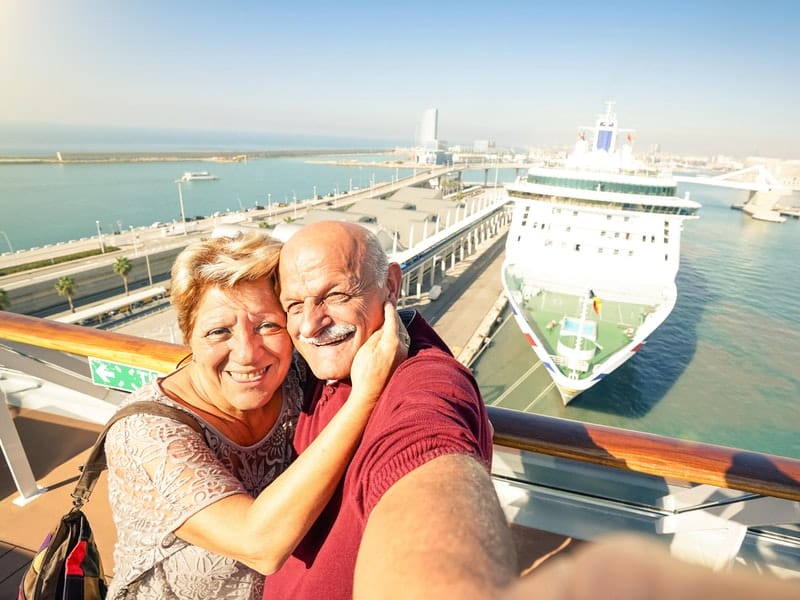Cruisers over 70 are struggling to find Covid travel insurance for their holidays, with some companies charging almost three times the normal price.
Readers have told Cruise Passenger they have sought advice from major insurance companies but found “price gouging” quotes as high as business class fares.
“Aussie cruisers are aged between 55 and 75 your example of two 45-year-old passenger is really pie in the sky stuff. We just tried to book a worldwide multi trip annual through all the insurers you mentioned and the prices for two people fully vaccinated aged 62 and 68 ranged from $3500 to $8500 ridiculous pricing aligning with business class airfares. Looking like nothing but price gouging by our insurance companies banking on peoples fear when Southern Cross Travel Insurance last November gave the same policy type for $1250,” wrote Vic.
“We also tried a month-long policy for international and multi night cruising and the cheapest was $1900 the worst was $3800.
“When you compare to the USA, Australians are well and truly being ripped off by insurance companies with regards to pricing and benefits.”
Another reader said they had ended up having to get cover through their health fund, rather than big insurance companies.
“We are both in our 70s and have some pre-existing medical conditions. We are going on a 16-day cruise to NZ in December and have paid roughly $900 for cover through our health fund which covers cruising and the pre-existing conditions and treatment for COVID onboard, but not cancellation due to COVID,” said reader Dena Jordan on Facebook.
“Covermore quoted around $1300; NIB was too complicated to navigate through the pre-existing conditions; and other insurers wouldn’t even quote for over 70s or wouldn’t cover the pre-existing conditions at all.”
According to Canstar more than 50 travel insurance providers on its database are currently selling new policies.
Most offer some form of cover for COIVD-19 related events but be sure to look at the detail.
For domestic and international cruising, 1Cover Travel Insurance, Allianz, Cover-More and NIB include COVID-19 diagnosis. Most include medical and hospital expenses, but Cover-More does not.
We compared a two-week cruise in the Mediterranean in July 2022 for two passengers aged 71 and here’s how the companies stacked up against each other. Bear in mind, this is a cruise only policy without any additional extra time spent onshore.
NIB
NIB will cover both passengers from $788 with a comprehensive travel insurance plan. The policy includes unlimited emergency travel arrangements and accommodation expenses, unlimited overseas medical expenses, $16,000 worth of hospital compensation, $1,000 of post-hospital accommodation, unlimited medical evacuation and repatriation and more.
Allianz
One of the world’s largest insurance companies offer a comprehensive as well as a multi-trip policy. Allianz’s comprehensive cruise policy covers unlimited medical cover while cruising, unlimited evacuation cover from ship to shore and up to $500 or $50 per day if you are confined to your cabin. Allianz’s comprehensive policy with the cruise pack costs $364.18 for two people or $1,170.98 for a multi-trip policy.
1Cover
1Cover’s comprehensive policy is priced at $675.71 for two people and offers unlimited overseas emergency medical assistance, unlimited emergency medical and hospital expenses and up to $1,500 if you are confined to your cabin. But the policy does not cover cancellation fees and lost deposits due to COVID-19. 1Cover are currently having a sale and the original price of this policy was $711.27.
Cover More
Cover More offers an International Comprehensive policy that costs $722 for two people. The policy includes unlimited overseas medical expenses and cancellation cover of up to $8000. It also covers up to $500 of Travel Services Provider Insolvency.









Hi happy cruisers.
I refer to the original release of the insurance article 19th May showing insurance company comparisons.
I have to say I have not found any prices that come anywhere near those quoted. I have sent Cruise passenger copies of quotes. I only write if I have the facts.
What surprises me is since the follow up article and confirmation by others having similar experiences the momentum to get action seems to have slowed.
With a mailing list of 150,000 you would think comment would have come from cruise companies and insurance companies.
More especially insurance companies disputing our claims and proving us wrong.
I would hope the momentum has not been lost In bringing them to account.
On another subject of rip offs.
Passports.
We made a impulse decision to go to Bali.
I found I only had six weeks left on my existing passport.
I completed the on line renewal.
As I read through noted there could be a six week return period.
I then noted you could accelerate the approval paying a fee.
Being 76 I renewed for five years at a cost of $155.
You could not come anywhere guessing the fee for faster processing.
$225
So check your passports .
You would have seen the queues recently.
If you need to renew allow yourselves plenty of time.
Good cruising
Steve
RE USA travel insurance policies. Yep much cheaper premiums for a far inferior coverage. Seen them. Lots of what I call ‘Friday 13th’ clauses. As in “Oh it happened on Friday 13th. No we don’t cover that day.” Had a USA friend post me her covid coverage. She had not read the exclusions on a different page to the cover. LOTS of gaps.
Hello Janice. Try the road motor associations for coverage. Otherwise get her doctor to write an explanatory letter, including comparable risk to the general population. Then try using that. I’ve been partially deaf since birth and have occasionally had insurance issues. Generally I simply explained the details and my cover was not affected by it. Got to get to the right person at the insurer for that. Alternatively the doctor’s letter might reveal a bit more than your friend’s current understanding of her condition.
It’s getting harder and harder for us oldies (80) !!! We are two active 80 year olds. We are the seniors age group that does the most cruising.
I wish that “ help” was on the way. Our travel insurance is now megabucks.
Cover More cover less when it comes to covid and i have the paper work to back me up and i would say other people would have the same paper work from when covid first broke out as it was not a pandemic until it became pay out day
So Southern Cross was way cheaper? I used to use them. Then their policy wording changed. For example, they added a clause which is unenforceable at law. I exchanged emails with them. Effectively they agreed that it was unenforceable but they would not remove it. So why keep it in the wording? The law does not make it illegal to have an unenforceable clause. It simply says you can’t use it. The trick is the customer has to know that clause IS unenforceable and can’t be used. It would be so easy to be quoted that clause as a reason to deny a claim. It was their clause about unknown pre-existing medical conditions. The law says if you genuinely did not know about a pre-existing condition, and a reasonable person would not be expected to know, then that condition cannot be excluded. Southern Cross were not alone in excluding unknown pre-existing conditions.
Insurance is a good example of generally you get what you pay for. Just because you can get a cheaper policy, it doesn’t mean it’s a better policy. I’ve read and analyzed lots of travel policy wordings and in particular covid clauses. (I used to teach Insurance Law). Some are very restrictive on when and what they cover. One had a limit of 1,500 Euros. That may not even cover a cruise evacuation! Another only covered time on the cruise. Get covid coming or going, then you are on your own. Some didn’t cover loss of payments if you got covid before departure date.
Insurance premiums are based upon claims / risk. Claims / risk depends upon what is or is not included, exclusions, limits on payments, etc. ie the policy wording is critical. To say you found a cheaper insurance cover is akin to saying you found a cheaper car. You are highly unlikely to be comparing the same things at all.
One of the most important differences is pre-existing health conditions. Some policies provide coverage for some conditions for no extra charge, but have blanket exclusions for certain conditions. Fall into one of those exclusions and there’s no cover. Some allow you to be assessed for those conditions excluded by others and pay extra premiums to have them covered. I think the last policy I bought doubled in cost for cruise cover, USA cover and all pre-existing conditions covered in full. I willingly and gladly paid it to be fully covered.
Remember all those ‘free’ credit card travel insurance polices? Not only did you have to had paid your fares, etc using the card, you had to negotiate the very limited policy wordings. Do you think the credit card companies were providing unlimited trips ‘free’ travel insurance worth thousandth of dollars? If you wanted to save money and rely upon them, then you took a risk of big gaps in your cover. If you wanted proper coverage, you needed to get a proper policy.
I have a friend who has an irregular heart beat which causes her no problems and is something she has had since birth. Has not been able to find travel insurance to even consider her even with an extra premium.